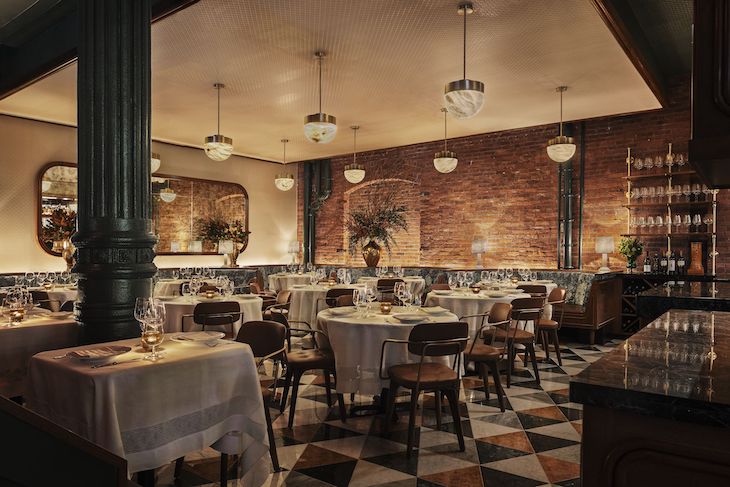Scoring a reservation at one of New York City’s buzziest restaurants like Carbone, 4 Charles, or Don Angie used to be a matter of skill and persistence. Hopeful diners would set alarms to be ready the moment reservations opened on sites like Resy, vying for the few coveted tables. But in recent years, the reservation game has changed. Now, scoring a table at these red-hot eateries can cost hundreds of dollars – on top of the already exorbitant meal prices.
Welcome to the new opaque market for elite restaurant reservations, where third-party platforms like Appointment Trader are auctioning off bookings to the highest bidders. The practice has earned the ire of celebrity chefs and restaurateurs, but platforms like Appointment Trader defend it as a way to democratize access. So how did we get here? Why are people paying so much for the privilege of eating out? And what does the rise of the reservation aftermarket mean for the way we dine?
The Anatomy of a Hot Restaurant in New York
To understand why people pay hundreds for reservations, you first need to know what makes a restaurant “hot.” The spots that command the highest resale values on sites like Appointment Trader have a few key traits in common: celebrity chef status, tiny capacities, and months-long waitlists.
Restaurants like Carbone, the Italian-American hotspot from Mario Carbone, Rich Torrisi, and Jeff Zalaznick, check all three boxes. Carbone only seats around 60 guests across a few tightly-packed tables. Meanwhile, chef Mario Carbone has earned celebrity status from TV appearances and James Beard awards. This combination of limited supply and intense demand creates the perfect conditions for a red-hot restaurant scene.
Before third-party reservation platforms, scoring a spot at Carbone meant religiously tracking their Resy page. When rare openings popped up, seats would disappear in seconds as hopefuls pounced. For those unwilling or unable to compete in the reservation rat race, that meant possibly waiting six months or more for a table.
The Reservation Aftermarket Emerges
This level of scarcity and competition spawned the growth of a reservation aftermarket. Platforms like Appointment Trader let people sell their reservations to the highest bidder, often netting hundreds of dollars.
According to Appointment Trader’s founder Jonas Frey, diners have purchased an average of $20,000 worth of reservations per day in recent weeks. The most coveted spots can sell for $500 or more once you factor in the cost of the meal.
Of course, reselling reservations violates most restaurants’ policies. But that hasn’t stopped individual sellers and platforms like Appointment Trader from building a lucrative business. Top seller Alex Eisler, a college student at Brown University, has earned over $100,000 reselling reservations he snaps up using bots and multiple accounts.
Why People Pay at Restaurants?
From the outside, it can be hard to understand why people pay so much money on top of an already expensive meal. But when you consider the level of obsession surrounding restaurants like Carbone, the seemingly outrageous prices start to make sense.
For one thing, people are paying for access. By purchasing a reservation, they can skip months-long waitlists and experience restaurants that would otherwise remain out of reach. In cities like New York where the dining scene is hyper-competitive, access equals status.
There’s also the fear of missing out. For many foodies, scoring a reservation at the restaurant of the moment offers rare bragging rights. They’re willing to pay hundreds to secure their spot in the social media spotlight.
Prestige and convenience help explain the reservation aftermarket’s growth. But that doesn’t make the practice any easier for everyday diners to swallow.
The Downsides of the Aftermarket
Reselling reservations has earned backlash both for its legality and effects on accessibility. By auctioning off tables, third-party platforms let affluent diners cut the line and make hot restaurants even more exclusive. That dynamic doesn’t sit well with either restaurants or their customers.
Industry insiders argue that reselling reservations defeats the purpose of hospitality. Restaurants want to welcome as many guests as possible, not prioritize those with the deepest pockets. Understandably, many celebrity chefs have condemned Appointment Trader and similar platforms.
There are also concerns that if left unchecked, the reservation aftermarket could spread beyond New York and distort dining norms. Sites like Appointment Trader defend their practices as a way to democratize fine dining. But opponents counter that adding even more barriers to entry only further limits accessibility.
The Future of Restaurant Reservations
For now, the reservation aftermarket shows no signs of disappearing in competitive cities like New York and San Francisco. But backlash from restaurants could prompt platforms like Appointment Trader to shift their practices in the future.
Some industry experts even predict that restaurants will take reservations into their own hands to prevent reselling. That could mean charging diners directly to book the hottest seats. Others expect to see more variable or dynamic pricing models that adjust costs according to demand.
But whatever the solution, one thing is clear: scoring a spot at the trendiest restaurants is only getting harder and more expensive. The days of easily snagging a table at the hottest new spot are long gone in major cities. For those unwilling to pay the premium, that unfortunately means waiting or looking beyond the headlines to find the next big thing.
The opaque market for elite restaurant reservations didn’t appear overnight. But now that paying hundreds for a booking is commonplace, we’ve clearly entered new territory in the world of dining. Where the reservation aftermarket goes next remains to be seen.

















